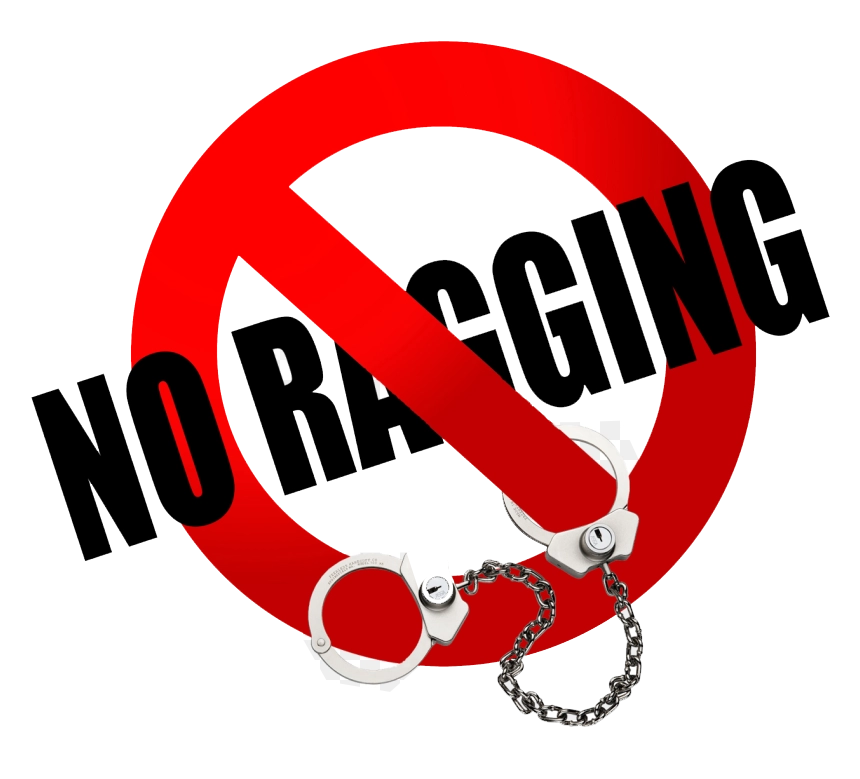Anti Ragging Committee
Anti Ragging Committee

VIT gives immense emphasis on maintaining a ragging free campus. Anti-Ragging Committee is constituted with Director, Students’ Welfare as Chairperson; Assistant Directors, Students’ Welfare as Members and nominated Faculty members from each school as Coordinators. Along with the Coordinators from each school, there is a team of squad members that comprises of faculty as well as staff members.
If any student has any grievance in the nature of ragging, including any kind of harassment, the same can be brought to the notice of the Chairperson or any of the Committee Members from various schools, for necessary action and redressal.
Chair Person
Dr. NAIJU C D
Director, Students’ Welfare
Committee
Dr. MOHANASUNDARAM R
Director MH
Dr. NIRMALA G S
Director LH
Ar. DINESH RAGHAVAN ES
Assistant Director,SWF
Dr. RAJU J
Assistant Director,SWF
Dr. VARALAKSHMI M
Assistant Director,SWF
Dr. PRADHEEP T
Assistant Director,SWF
Dr. MOHANA PRIYA A
Assistant Director,SWF
Mr. VEERARAGHAVAN R
Chief Security Officer
Rtn. PHF.V. ARUMUGAM
NGO - RID-3231
Rtn. UMA GANESH
NGO - RID-3231
Mr. MOHAN
Local Press and Media Representative
Mr. EALUMALAI S
Inspector of Police
Mr. MAGESH CHANDRASEKAR
Parent
Mr. ANBARASU S
Parent
Mrs. VASUDHA SIMHA
Parent
Mrs. DEVI BALA
Parent
Mrs. VIJAYAKUMARI
Parent
Mr. AJAY S
Civilian
Mr. RAJAT AGRAWAL
Senior Student- Final Year
SREEMATHI M
Senior Student- Third Year
SIDDHARTH MAHINDRAKAR
Senior Student- Second Year
Mr. SRINATH
Fresher Student
Mr. ARASU D
Section Supervisor, SW
Ms. GAYATHRI MOHAN
Assistant Manager, SOD
SQUAD – FACULTY MEMBER
Assistant Professor Sr. Grade 1
jesufrederick.t@vit.ac.in
HOT
PROF. SASANKA BHUSHAN PULIPATI
Associate Professor Grade 1
sasankabhushan.p@vit.ac.in
SCE
PROF. SHISHIR KUMAR BEHERA
Professor Grade 2
shishir.kb@vit.ac.in
SCHEME
PROF. ABDUL GAFFAR H
Associate Professor Sr
abdulgaffar@vit.ac.in
SCOPE
PROF. GUNASEKARAN G
Associate Professor Sr
ggunasekaran@vit.ac.in
SCORE
PROF. RAVI K
Professor Grade 2
k.ravi@vit.ac.in
SELECT
PROF.RAVI KUMAR C V
Associate Professor Grade 2
ravikumar.cv@vit.ac.in
SENSE
PROF. JOEL J
Assistant Professor Sr. Grade 1
joel.j@vit.ac.in
SMEC
PROF. SUDHEER C V
Assistant Professor
sudheer.cv@vit.ac.in
SSL
PROF. THIRUMALAIKUMAR R
Assistant Professor Grade 2
thirumalaikumar.r@vit.ac.in
VAIAL
PROF. ANKIT KUMAR
Assistant Professor Sr. Grade
ankitkumar@vit.ac.in
VSPARC
PROF. KISHOR LAKSHMI NARAYANAN
Associate Professor Grade 1
kishor.ln@vit.ac.in
SHINE
PROF. ANAND PREM RAJAN
Professor Grade 1
janandpremrajan@vit.ac.in
SBST
PROF. SAKTHI SRINIVASAN K
Professor Grade 2
ksakthisrinivasan@vit.ac.in
VITBS
PROF. RAJKUMAR G
Assistant Professor Sr. Grade
g.rajkumar@vit.ac.in
VSIGN
PROF. RAJA M
Assistant Professor Sr. Grade 1
raja.m@vit.ac.in
VSMART
PROF. EZHILMARAN D
Associate Professor Sr
ezhilmaran.d@vit.ac.in
SAS
What constitutes Ragging?
Ragging constitutes one or more of any of the following acts:
- Any conduct by any student or students whether by words spoken or written or by an act which has the effect of teasing, treating or handling with rudeness a fresher or any other student.
- Indulging in rowdy or in disciplined activities by any student or students which causes or is likely to cause annoyance, hardship, physical or psychological harm or to raise fear or apprehension thereof in any fresher or any other student.
- Asking any student to do any act which such student will not in the ordinary course do and which has the effect of causing or generating a sense of shame, or torment or embarrassment so as to adversely affect the physique or psyche of such fresher or any other student.
- Any act by a senior student that prevents, disrupts or disturbs the regular academic activity of any other student or a fresher.
- Exploiting the services of a fresher or any other student for completing the academic tasks assigned to an individual or a group of students.
- Any act of financial extortion or forceful expenditure burden put on a fresher or any other student by students.
- Any act of physical abuse including all variants of it: sexual abuse, homosexual assaults, stripping, forcing obscene and lewd acts, gestures, causing bodily harm or any other danger to health or person.
- Any act or abuse by spoken words, emails, post, public insults which would also include deriving perverted pleasure, vicarious or sadistic thrill from actively or passively participating in the discomfiture to fresher or any other student.
- Any act that affects the mental health and self-confidence of a fresher or any other student with or without an intent to derive a sadistic pleasure or showing off power, authority or superiority by a student over any fresher.
- Any act of physical or mental abuse (including bullying and exclusion) targeted at another student (fresher or otherwise) on the ground of color, race, religion, caste, ethnicity, gender (including transgender), sexual orientation, appearance, nationality, regional origins, linguistic identity, place of birth, place of residence or economic background.
The contact telephone nos. and email ID are given below:
- Chairperson Email
- arc.sw@vit.ac.in
- University Hotline
- 0416 - 220 5005 , 0416 - 220 2240 , 0416 - 220 2680 , 0416 - 5055



